Schüler und Wittmayer 1949
Description

| Date: | 1949 |
| Origin: | Bad Reichenhall - Germany |
| Serialnumber: | --- |
Kurt Wittmayer, Neupert and Sperrhake were the most active and successful harpsichord makers of the post-war period. Due to their new instruments, the harpsichord experienced a large-scale rediscovery in Europe in the period after 1945. This instrument presented here was built in Bad Reichenhall in 1949 and is a testimony of the short collaboration of Kurt Wittmayer and Rudolf Schüler (1911 – 1995). The harpsichord is manufactured in a modern design (Rastenbauweise), which is based on the piano construction of that period. So far, many instruments by Kurt Wittmayer are known, also some made by Rudolf Schüler, but instruments from the collaboration of the two instrument makers are very rare and therefore this instrument represents a special rarity in terms of their company history. The collaboration lasted from 1949 to 1951. After that, both separated and built up their own workshops.
The case of the harpsichord is made of oak and has a square wing shape. The entire case is made very narrow (only 12 cm) and is therefore far ahead of its time and innovative. The instrument stands on three round legs, which form a nice contrast to the case shape, which suits in very harmoniously to the total appearance.
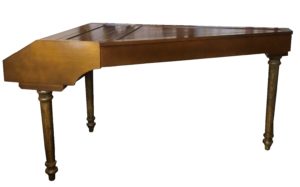
Harpsichord by Schüler und Wittmayer, Bad Reichenhall 1949 – Eric Feller Collection (2)
The harpsichord has 2 rows of wooden jacks with leather quills, two registers (8′ and 4′) and a divided lute for the 8′ register. The compass is 4 ½ octaves (CC – f3). Interesting is that the jacks are pushed down by a metal spring. The nameboard is signed with:
“Schüler und Wittmayer”
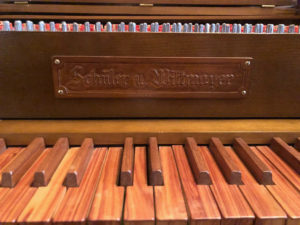
Harpsichord by Schüler und Wittmayer, Bad Reichenhall 1949 – Nameboard – Eric Feller Collection
The lid of the instrument is divided in two parts and the fallboard functions as a music stand. Below is the year of manufacture 1949 written in pencil. The registers can only be switched using a sliding coupler. In the front position the 4′ stop can be heard, in the middle position the combination of 8′ and 4′ and in the rear position the 8′ stop. There are two levers for the lute on the sides.
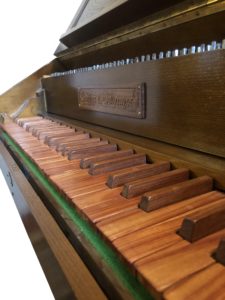
Harpsichord by Schüler und Wittmayer, Bad Reichenhall 1949 – Eric Feller Collection (3)
The sound of the instrument is very clear and rich in overtones. Because of its modern construction it is a completely new designed instrument and the sound is not comparable to historical harpsichords.
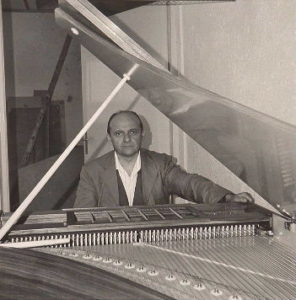
Kurt Wittmayer (1917 – 1997)
Kurt Wittmayer was born on November 22, 1917 in Sibiu, Romania. After graduating from high school, he studied organ in Leipzig, Rome and Salzburg. From 1945 he taught himself how to build harpsichords and clavichords, first alone and later with the engineer Rudolf Schüler (1911 – 1995). In February 1949 they both opened a workshop for historical keyboard instruments in Bad Reichenhall. However, the cooperation lasted only about 3 years and in 1951 both separated and each built their own instruments. Due to the increasing demand for the new instruments, Kurt Wittmayer was able to continuously expand his workshop.
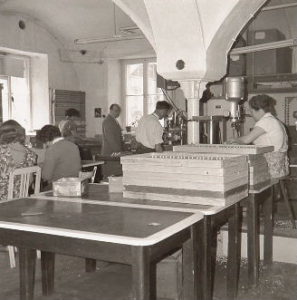
Kurt Wittmayer Company (1)
From 1950 he built instruments in Königsdorf, from 1952 in Geretsried-Gartenberg and in 1967 also in Wolfratshausen. The instruments reached a high production number. In later years, the company also built historical copies, as the trend was getting away from the “Rastenbauweise” (industrial/serial construction). Kurt Wittmayer died on September 4, 1997 in Bad Tölz.
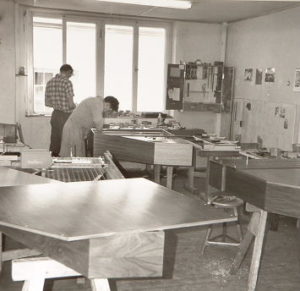
Kurt Wittmayer Company (2)
| Length: | 174 cm |
| Width: | 85 cm |
| Height: | 12 cm |
| Circumference: | 4 ½ Oktaven C - f3 |
| Mechanics: | wooden jacks with leather quills |
| Pedals: | 2 registers (8' & 4') , lute stop |
| Signature: | "Schüler und Wittmayer" |

